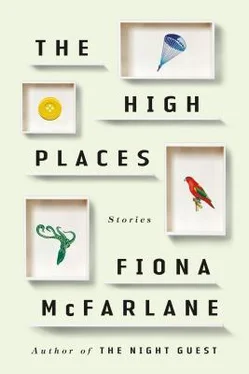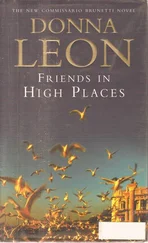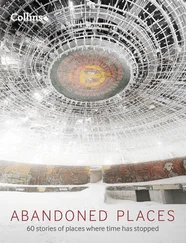Tony is not my son.
Tony’s brother calls out to our boys, still sitting on Santa’s throne. The tree has fallen just shy of them, on their right side. Its wide branches form a glade over their heads, and in this forested darkness the boys sit quietly, unsure of how to answer. Tony’s brother has forgotten their names — he calls, ‘Kids! Kids!’ and eventually they call back, ‘Yes?’
James, eight. Greg, eleven.
In a testament to his luck and ball skills, Greg has managed to catch a flying red bauble the size of his brother’s head. James has a lapful of PVC pine needles, and these make scratch marks on his knees. The throne, bolted to the stage, has held back other branches. Thinking of this, the boys in their felled forest, I wonder, Really? Can this be all?
Our boys can see Tony through a tunnel of green, and they see Tony’s brother climbing over him, in the tree.
‘You boys all right?’ says Tony’s brother. He’s dialling emergency.
Greg says, ‘Yeah.’ The boys are pushing now through the branches, which bend away with ease and then spring back. Greg jumps down from the stage and turns to help James do the same. It looks like they’re emerging from the carcass of a monster.
‘You know the way back to my office?’ asks Tony’s brother.
Greg doesn’t.
‘I know your office,’ says James. Then he runs. I can see him running, arms moving backward and forward, good at reading maps, knowing how to find an office.
And Greg follows him, wondering how he knows.
* * *
I know what happens next; there’s no need to speculate. I’m down at the train station when Greg calls. I’ve parked the car and am standing on the bridge across the tracks, looking at the platform and checking the illuminated tops of heads. A train comes as we speak, and it doesn’t stop or even slow, but races through.
‘I’m coming,’ I say. And I go — I drive to the shopping centre, to the loading bay, and there among the lights of the emergency vehicles I see our boys. I haven’t called Glenda yet. I will, when I’ve seen them. I don’t want her to have to wait for bits of news, but to hear it all at once. And I don’t want to go home to her without them. This is how I explain it, later. But the truth is that I don’t think of her, not really, until I see them sitting there on a pile of flattened cardboard. Their poses are identical: hands in fists and placed on knees, and they look up and out beyond themselves, as if waiting for a photo to be taken. They are fine, they are whole, and I wonder for the first time, Really? Can this be all?
It’s dark when we turn into our street. My parents’ car is in the drive, and my father helps my mother out of it. I see the way he holds her elbow as she bends and straightens. Glenda must have called and asked them to come; I know this because they have no gifts, and because she’s waiting there on the lit front steps. They go to her and my mother holds her, my father puts one hand up on her head. There is a day in the future when one of them will fall and find it difficult to recover, when one of them will receive a diagnosis or become forgetful or weak. I wonder which of them will be the first.
Those Americans Falling from the Sky
When I tell our husbands the story of the bad-luck Americans, I begin with Edith because when the Americans came, moving into the airstrip out of town, expanding it with new buildings and sheds and hangars, bringing with them a brass band that practised in the streets of a Saturday, I thought of the planes that hummed over our newly crowded sky as tiny Ediths with their parrot faces pointed toward the sun. Edith was a short woman, short enough maybe to count as a dwarf, and from the back she looked like our kid brothers. From the front she was about sixty, and looked like a parrot. Her lips were pale and hard and fused. Her eyes were small and dark. They rotated backward, first one way, then the other, whenever the kitchen in which she was talking was invaded by a man.
Edith called us Eleanora and Jean Louise when Nora and Jeanie did at home and everywhere else. She was one of those people who act out every story they tell, waving her arms, reproducing facial expressions, running around our kitchen like an unfamiliar cat. She acted out the air raids on London — a miniature plane tilting at our table, dropping erratic bombs that rattled the teacups. These gymnastics tired our mother. When the Baptists came every few Sundays, leasing our pond to wash their sins away, Edith was always among them, hopping side to side with her parrot step. Our mother would pull the shutters to shut out the hymns and say, ‘Don’t let them come in, not today, and not that Edith. If she comes up inside I’ll die of tiredness. I know I’ll die. She just tires me and tires me out .’
When we saw her in town she was brisk and chatty. It was Edith, for example, who explained to us, one Saturday morning on Merrigool’s main street, about the internment camp.
‘They’re bringing in Chinamen, by the truckload,’ she said.
‘They’re not from China,’ said our mother. ‘They’re from Japan.’
‘Well,’ said Edith. ‘They’re all Orientals, aren’t they.’
I thought of a missionary talk she had taken us to about the work of God in China, the blessed and dangerous work of God among the delicate foods and feet of China, with a woman in Chinese dress telling us not to be confused between the Taiwanese and the Chinese, and especially not the Japanese, and certainly not the Malays.
‘God bless the Americans,’ cried Edith, raising her bird hands to Heaven right there on the street, ‘and our boys.’
Despite this blessing, the Americans brought nothing but bad luck — for us, but mostly for themselves. They blustered through town and held dances and attended church, or so we heard, dressed in uniforms so stiff they could hardly expand their lungs to sing. They were shiny and good-looking. After the war plenty of girls packed their suitcases and, clutching letters and photographs, departed for promised love in exotic places like Texas and Montana. With their easy walk and their well-combed hair, the Americans seemed brave and fortunate. But as it turned out, they had a strange aptitude for dying on the outside of the war.
Our father, on the other hand, Nora’s and mine, died on the very inside of the war. He always succumbed to things quickly. When we were younger, before the war, he panicked at the thought of financial difficulty. Word of crashing markets and worthless bank accounts reached Merrigool by train and newspaper, and our father leased out our fields amid speculation about the future of beef and milk. A little later he sold the farm off, piece by piece, until we were left with the house, the yard, the pond, the gully and the creek. Also, the drive reaching out to the Merrigool road, and the yardy, pondy, bushy strip leading from the house back to the hills. Then he left on a truck for Sydney, looking for work, and never came back. At some point he and our mother were no longer married. Frank arrived and became our stepfather, and then there were more children, and the war. Our father sent us a letter to say he had enlisted, and in the envelope, a photograph of him at a wedding, standing by a woman in white we’d never heard of.
He died in Egypt, in a yellow-walled hospital, in the midst of befriending the nurses, taking sips of smuggled whiskey from strangers, cradling a crushed arm. He sent us letters, childlike and left-handed, or dictated to someone who added comments in French that we couldn’t understand. One day we received a letter from a woman named Hélène, also from Egypt, accompanied by a rainbow school of foil fish, all neatly cut from sweet wrappers by our father’s careful, concentrating left hand. There were over two hundred of them. We played with them for a week before abandoning them in a silver-backed pile. For many years afterward we found stray fish around the house, blue and gold minnows beneath loose tiles, brilliant green sardines swimming in the dust behind chests of drawers. Hélène sent the fish and her sympathy and her admiration for our father. His love for his daughters provided solace to the end. In the valley of death he had heard the Word of God, and was comforted.
Читать дальше












